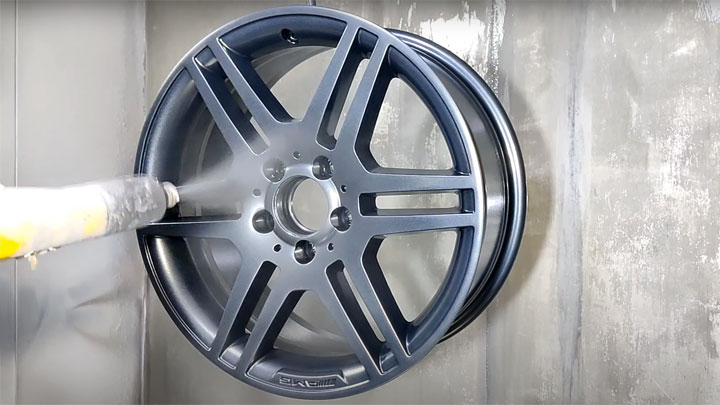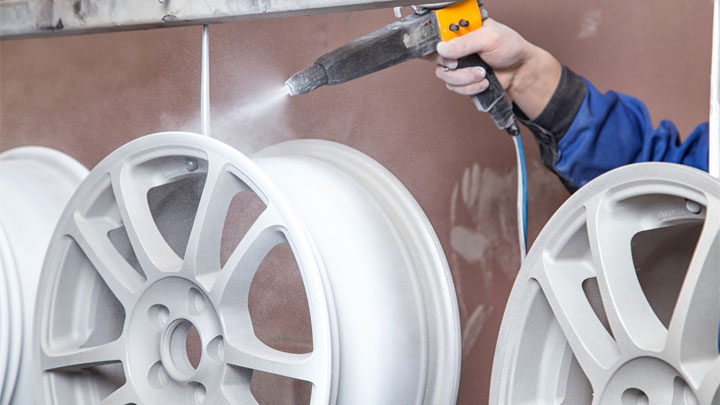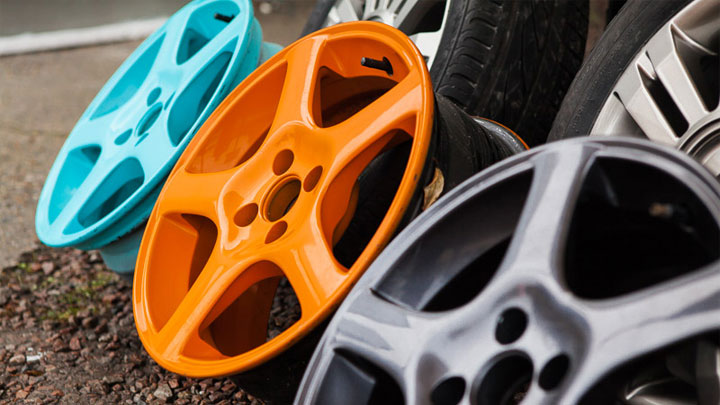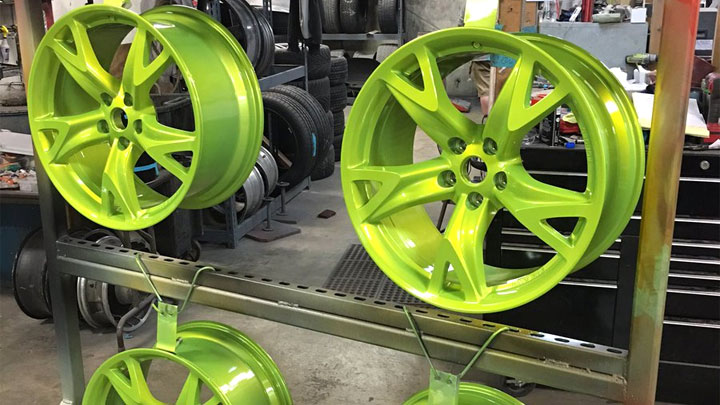How Much Does it Cost to Powder Coat Wheels?
A quality set of wheels can significantly enhance your vehicle’s appeal whether you have a sports car, Jeep, or 3/4 ton truck. Powder coated wheels boasting a sporty, distinct finish have surged in popularity in recent years. If you’re considering powder coating your wheels, you likely have questions.
This guide will answer key questions such as the cost to power coat wheels, how long it lasts, and whether any type of wheel can be powder coated.

See Also: Average Cost to Paint a Bumper
Average Cost to Powder Coat Wheels and Rims
For many consumers wishing to have their wheels powder coated, the first question that comes to mind centers around the cost associated with such services. While reports of “at-home” powder coating are plentiful, the bulk of these cases involve the application of rubberized spray-finishes, such as Plasti-Dip.
Related: How to Remove Plasti-Dip From Wheels
Though finishes of this nature can be applied to a vehicle’s wheels, often with satisfactory results, doing so is not considered powder coating, in a true sense. On the contrary, actual powder coating is typically performed by professionals, at a specialized facility.
Due to the complex nature of this work, one can expect to pay a reasonable sum for such services. The exact price of powder coating services often fluctuates with the cost of supplies.
However, one can expect to pay somewhere in the ballpark of $350-$700 to powder coat a set of four wheels.
The lower end of this price spectrum represents the treatment of smaller, sedan-sized wheels, with a singular base coating. On the other end of the spectrum, the higher end of this price range covers larger wheels that are to receive additional gloss or clear coats, beyond a standard base.
Read Also: Average Clear Coat Drying/Curing Times
What is Powder Coating?

Powder coating is a term used to describe the process of finishing a specific surface in a dry coating, which is often applied electrostatically and heat cured. The dry, powdered substance used within the powder coating process consists of a polymer base, which is infused with a mix of curatives, flow modifiers, leveling agents, and pigments.
When cured, powder coating is generally considered to be more durable than paint and is naturally resistant to chipping and flaking. This is due to the fact that powder coating actually bonds to any metallic surface on which it is applied.
Advancements in powder coating technology have created a wealth of opportunities for those wishing to customize their wheels. This coating can now be applied in virtually any color imaginable, as many new pigments are formulated for use with each passing year.
Is Powder Coating Wheels Better Than Painting Them?

In the vast majority of cases, powder coating is seen as a superior alternative to painting a vehicle’s wheels. This typically comes down to a matter of durability.
Since powder coated finishes are applied electrostatically, a lasting bond is created between cured coatings and any metal base stock beneath. This is in stark contrast to paint, which serves simply as a surface treatment.
As a result, powder coated finishes seldom chip, and last exponentially longer than painted finishes. This is important, considering the rigors of life on the road.
Powder coatings also tend to apply evenly, in a rather textbook fashion. One seldom runs into issues with inconsistencies, such as thin spots or apparent blemishes. Unfortunately, the same cannot be said for most painted finishes.
Read Also: Is a Car Wrap Better Than Paint?
How Long Does Powder Coating Last?
On average, most expertly-applied powder coated finishes can be expected to last for a period of 15-20 years. However, this number is also subject to variation, at the hands of such factors as excess UV exposure, heavy wear/tear, and exposure to corrosive agents.
This lifespan is nearly double that of painted-on finishes, which carry an expected service life of 5-10 years, under ideal conditions. However, powder coated finishes are still subject to many of the same pitfalls as paint-based finishes.
With time, powder coated wheels will undoubtedly scratch and fade, as a product of typical road-wear. Though this sort of wear is to be expected of any rim, no matter its surface treatment.
See Also: 6 Kinds of Car Scratches (Is DIY Repair Possible?)
Can Any Type of Wheel Be Powder Coated?

Powder coating can be applied to virtually any metallic surface, including most automotive wheels. Both steel and stainless steel wheels can be powder coated, as can aluminum wheels, though treating the latter of these surfaces presents its own specific challenges.
Careful consideration should be taken before having a set of aluminum wheels powder coated. The temperatures necessary for the curing of powder coated surfaces often exceed that which is utilized during heat treating of aluminum wheels.
Therefore, in extreme cases, the structural integrity of an aluminum wheel could be compromised during the powder coating process.
For this very reason, many manufacturers void the warranty of any aluminum wheels that are sent for powder coating. While this should be of little issue to those who have owned their vehicle for quite some time, owners of vehicles still within their original warranty period should think twice before carrying on with such endeavors.
Aside from a wheel’s composition, the condition of any rim intent for powder coating should also be carefully studied. This stems from the fact that damaged or bent rims are often difficult to evenly coat, which can in turn lead to a number of visual defects.
- P0480 Code (Symptoms, Causes, and How to Fix) - Apr 19, 2024
- Car Temperature Gauge Stopped Working? (Here’s Why) - Apr 15, 2024
- Ignition Coil vs Coil Pack (What’s the Difference?) - Apr 8, 2024

Is it possible to powder coat one rim instead of all four if I rash up only 1 rim?
Sure, why not? I think the cost is typically per wheel anyway.